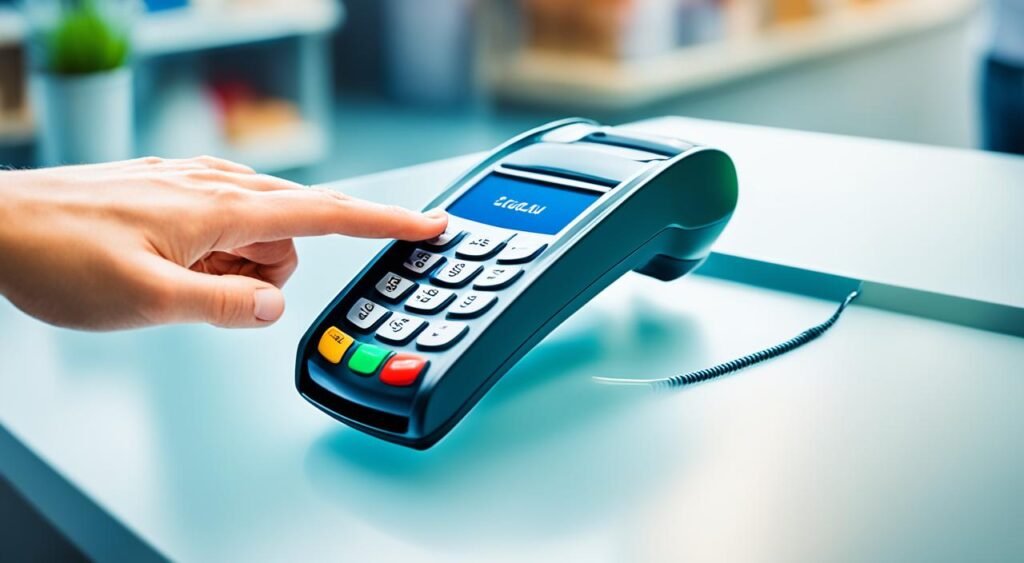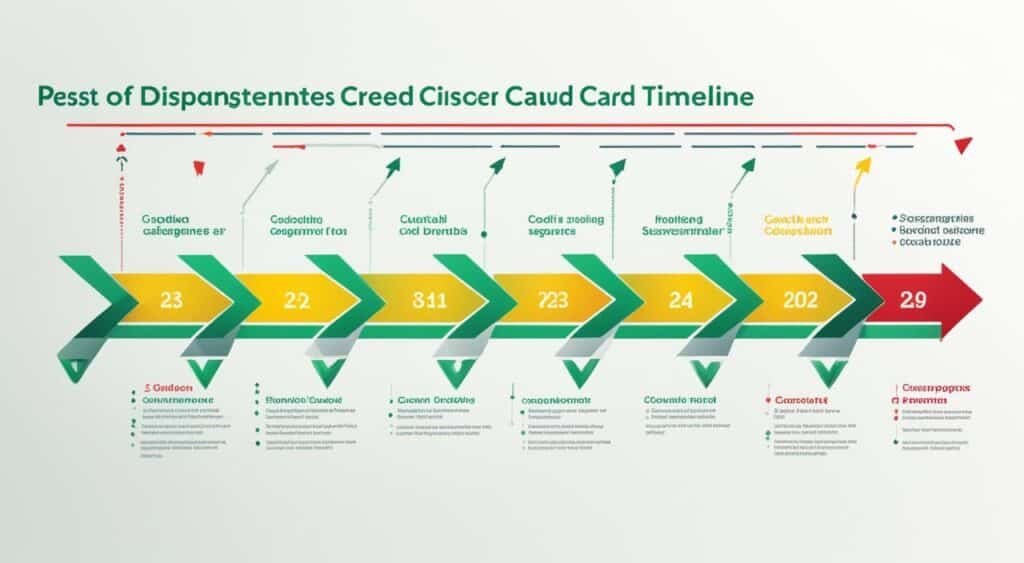What Are The Steps To File A Credit Card Dispute?
Credit card disputes help consumers fix unauthorized or wrong charges on their statements. The Fair Credit Billing Act (FCBA) lets cardholders challenge billing mistakes and unauthorized charges. They can also dispute claims and defenses against merchants for bad goods or services.
To start a credit card dispute, you must talk to your credit card company within 60 days of seeing the disputed charge. The company has 30 days to say they got your dispute. Then, they have 90 days to look into and fix the issue.
Key Takeaways
- Credit card disputes help fix unauthorized or wrong charges on your card.
- The Fair Credit Billing Act (FCBA) gives you the right to dispute billing errors and unauthorized charges.
- You must contact your credit card company within 60 days of seeing the disputed charge.
- The company has 30 days to acknowledge your dispute and 90 days to solve it.
- You can also challenge merchants for bad goods or services.
Understanding Credit Card Disputes
Dealing with credit card disputes can seem tough and confusing. But, knowing the basics can help consumers keep their finances safe. A key idea is the chargeback. This is when a cardholder asks the card company for a refund, not the store.
What Is a Chargeback?
A chargeback is when the cardholder asks to reverse a transaction. This usually happens if there were unauthorized charges, no refund was given, or if the product was damaged or not as described. Chargebacks help consumers fight charges they don’t think they should pay, making sure their rights are looked after.
Reasons to Dispute a Credit Card Charge
- Unauthorized charge: A transaction the cardholder didn’t okay or take part in.
- Merchant refusal: The store won’t give a refund or credit for a valid return or cancellation.
- Defective product: The item got is not what was promised or is broken.
- Undelivered product: The item was never sent.
- Cancelled subscription: The consumer cancelled a subscription but was still billed.
Consumers can dispute any charge they think they shouldn’t have to pay. Knowing why you might want to dispute a charge is the first step in protecting your money.
Recognizing Unauthorized or Fraudulent Charges

It’s important to keep an eye on your credit card statements. This helps you spot unauthorized credit card charges or fraudulent charges. These can be charges made by someone else, wrong amounts, or for things you didn’t get.
Seeing credit card fraud quickly is key to protecting yourself. Here are steps to spot unauthorized charges:
- Regularly review your credit card statements to find any strange or suspicious charges.
- Watch for charges that don’t fit your usual spending or things you didn’t buy.
- Be careful of small, recurring charges which could mean identity theft.
- Check for charges from places you’ve never been or for services you didn’t get.
“Staying vigilant and proactively monitoring your credit card activity is the best way to catch fraudulent charges early and minimize the impact of credit card fraud.”
If you think there are unauthorized credit card charges, contact your card issuer right away. Quick action can protect you from identify theft and reduce your liability for fraudulent charges.
Contacting the Merchant First

Before filing a credit card dispute, try to resolve the issue directly with the merchant. This “good faith effort” is needed for some disputes, like claims and defenses. By contacting the merchant, you can often resolve the issue with the merchant. This way, you might not need a formal dispute process.
Steps to Take Before Filing a Dispute
- Contact the merchant and explain the issue. Give a detailed description and any supporting documents.
- Gather any relevant documentation, like receipts, emails, or photos. This will help strengthen your case when you file the dispute with the card issuer.
- Try to resolve the issue with the merchant with a good faith effort before going to a formal dispute.
- If the merchant doesn’t respond or won’t resolve the issue, then you can prepare to file a dispute with the card issuer.
By contacting the merchant first and gathering documentation, you can often resolve the issue with the merchant. This approach shows you’ve made a good faith effort. It can also help improve your chances of resolving the dispute successfully.
Credit Card Dispute

Filing a credit card dispute is key for consumers facing unauthorized or wrong charges. Knowing the steps and timeline can lead to a successful outcome.
How to File a Credit Card Dispute
To start a credit card dispute, you must contact your card issuer in writing within 60 days of the first statement with the disputed charge. You can do this online, by mail, or over the phone. Make sure to include the charge details like the date, merchant’s name, and the amount.
Timeline for Resolving Disputes
- Acknowledgment: The card issuer must respond within 30 days, giving you written notice of the investigation.
- Investigation: They have 90 days to look into the dispute and decide on a solution.
- Withholding Payment: While they investigate, you can hold back payment on the disputed amount. The issuer can’t mark you as late.
- Resolution: If you win the dispute, the issuer must take back the charge and any extra fees or interest.
Knowing the credit card dispute process and timeline for resolving disputes helps consumers file disputes well. It also gives them confidence when disputing credit card charges.
Billing Errors vs. Claims and Defenses
When disputing credit card charges, consumers have two main paths: billing errors and claims and defenses. It’s important to know the differences to solve billing disputes well.
Handling Billing Errors
Billing errors can be things like unauthorized charges, wrong amounts, or charges for items you never got. You have 60 days from the first statement with the error to dispute it. This is a key time for you to use your consumer rights and tell your credit card issuer about the dispute billing error.
Claims and defenses are for purchases over $50. This is if the merchant is in your state or close to where you live, and you tried to solve the problem with them. You must file these claims and defenses within one year after the first statement with the disputed charge.
| Billing Errors | Claims and Defenses |
|---|---|
| Unauthorized charges, incorrect amounts, or charges for goods/services not received | Purchases over $50 where the merchant is located in the same state or within 100 miles of the cardholder’s billing address, and the cardholder has made a good-faith effort to resolve the issue with the merchant |
| 60-day dispute timeline from first statement containing the error | 1-year dispute timeline from first statement containing the disputed charge |
Knowing how to handle the dispute timeline and the differences between billing errors and claims and defenses is key. It helps consumers deal with credit card billing errors and protect their rights.
Your Rights During the Dispute Process
When dealing with consumer rights credit card dispute, the Fair Credit Billing Act (FCBA) offers key protections. It ensures that credit card issuers follow certain responsibilities during the credit card dispute resolution process.
The FCBA requires credit card issuers to respond to a dispute within 30 days. They must also solve it within 90 days. During this time, the cardholder can stop paying the disputed amount. They won’t be marked as late on their payments.
If the credit card dispute goes in the cardholder’s favor, the issuer must take back the charge. They must also remove any extra fees or interest. If the dispute is found not valid, the issuer must explain it in writing.
- Issuers must acknowledge a dispute within 30 days
- Disputes must be resolved within 90 days
- Cardholder can withhold payment on disputed amount
- Cardholder cannot be reported as delinquent
- Issuer must remove charge and related fees/interest if dispute is valid
- Issuer must provide written explanation if dispute is invalid
These consumer rights make the credit card dispute timeline and dispute resolution fair and clear. They protect cardholders from unfair billing practices.
“The FCBA grants consumers important rights during the credit card dispute process, holding issuers accountable and ensuring a fair resolution.”
Also Read: How Can Credit Card Benefits Improve Your Daily Life?
Conclusion
The credit card dispute process helps consumers deal with unauthorized charges and billing mistakes. It’s important to know the steps, timeline, and what documents you need. This way, you can use your rights under the Fair Credit Billing Act to fix issues and avoid financial loss.
Talking to merchants and checking your credit card statements carefully is key to resolving disputes. This lets you manage your money better and keep your account safe from fraud or mistakes.
The credit card dispute process is a key protection for consumers. It makes sure you’re not charged for things you didn’t agree to or didn’t get. By using this process, you can keep your credit card account safe and protect your finances.
FAQs
Q: What are the steps to file a credit card dispute?
To file a credit card dispute, you need to write to your card issuer within 60 days of seeing the disputed charge. They have 30 days to say they got your dispute. Then, they have 90 days to look into and fix the issue.
Q: What is a chargeback?
A chargeback is when you ask your card issuer for a refund instead of dealing with the merchant. You can do this for unauthorized charges, not getting a refund, or getting a damaged or defective product.
Q: What are some reasons to dispute a credit card charge?
You can dispute a charge if you think you shouldn’t have to pay it. This includes unauthorized transactions, wrong amounts, or not getting what you paid for.
Q: How can I recognize unauthorized or fraudulent charges on my credit card?
Look over your credit card statements for any charges that don’t belong to you. Watch for charges that are the wrong amount or for things you didn’t get.
Q: What steps should I take before filing a credit card dispute?
Try to solve the problem with the merchant before filing a dispute. This is called a “good faith effort.” Also, keep any documents that help your case.
Q: How do I file a credit card dispute?
To file a dispute, write to your card issuer within 60 days of seeing the charge. They have 30 days to respond and 90 days to solve the issue.
Q: What is the difference between billing errors and claims and defenses?
Billing errors are things like unauthorized charges or wrong amounts. You have 60 days to dispute these. Claims and defenses are for purchases over with merchants nearby. You must try to solve the issue with the merchant first.
Q: What rights do I have during the credit card dispute process?
The Fair Credit Billing Act gives you important rights. You can hold off on paying the disputed amount. You won’t be marked as late during the investigation. If you win the dispute, the issuer must remove the charge and any extra fees or interest.
Source Links
- https://consumer.ftc.gov/articles/using-credit-cards-and-disputing-charges
- https://www.experian.com/blogs/ask-experian/how-to-dispute-credit-card-charge/
- https://oag.ca.gov/consumers/general/credit-cards-dispute-charge
